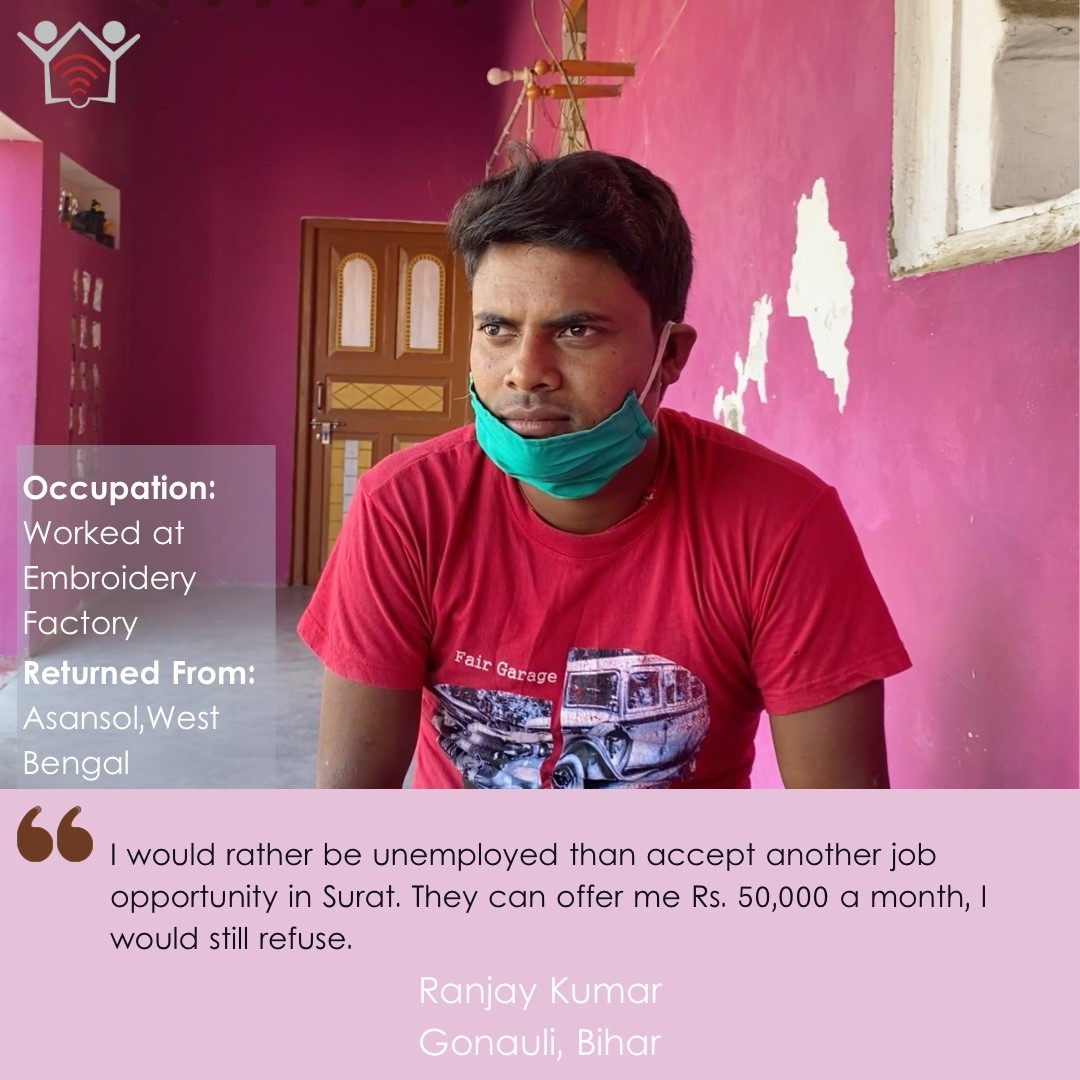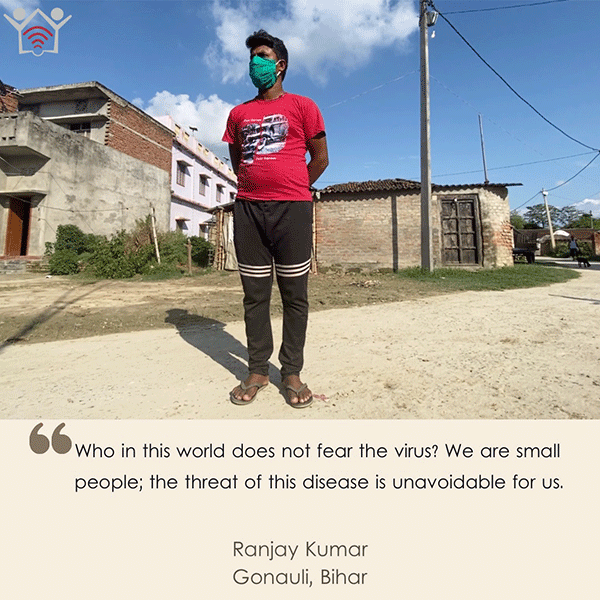Name: Ranjay Kumar
Hometown: Gonauli, Bihar
Occupation: Worked in an Embroidery Factory
Returned From: Asansol, West Bengal
Ranjay Kumar worked in Asansol, West Bengal to earn for this family in Gonauli, Bihar. He moved in 2010, returned home, migrated to Sonipat, Haryana. He returned home for a few months, followed by another move to Surat, Gujarat. The land Ranjay owns is infertile. It is necessary for the three brothers to split the house expenses. On 22nd March, Ranjay heard Janta Curfew guidelines on television news. It was forty-seven days later he was able to purchase train tickets.

Interviewer: What was your first encounter with the Covid-19 virus? How was your train-ride back home? What were the struggles?
Ranjay Kumar: The lockdown was implemented during my third month in Surat. Prime Minister Modi’s speech announced the Janta Curfew, I was baffled at the time. The company was suddenly shut, the police did not allow to leave the house, there were no open shops or vegetable vendors. Being able to plate a proper meal was an immense struggle.
I use a smartphone. I have had it for four years now; I’m proficient with WhatsApp and Facebook. I also have 393 friends. I do not use either to source information though, there are constant rumours and fake news. I do have ‘Aaj-Tak’. I remained updated through television news. They broadcasted the number of casualties, Prime-Minister Narendra Modi spoke through his speeches, how to prevent from infecting yourself. It was the badgering that forced me to acknowledge the pandemic.
I had saved Rs. 1,500. There were no available vehicles for rent to consider at the time. We lived rent-free for forty-seven days as the landlord understood our dilemma. I was compelled to borrow money from home for ration and other essentials. However, the trains were operational again. Thirty-five of us filled the necessary forms as guided by the government websites. There was no confirmation at first. We consequently consulted the local police station and the ‘Sarpanch’. New forms were filled and the wait continued for another twelve days. There was no update, upon demanding the status of our request, we were told to pay Rs. 800 per person even though I had heard the contrary through all sources of information.
We boarded the bus to the Surat railway-station from the local bus terminal. The train departed at 8 a.m. towards Chhapra, Bihar. At 6 p.m. the same day, we got our first meal; some water and biscuits. Again at 9 p.m., we received another small meal. The next morning, afternoon, and part of the evening, there was no provision of food or water. Following the screening procedure in Chhapra, there was another meal without water. The state-organised bus drove to Bettiah for the second screening, dropping us at the quarantine centre in Jogappati. It was a 26-hour journey, with 1,215 individuals on board.
The quarantine centre needed appropriate facilities; there were no lights, nothing to sleep on, no food. The ‘Sarpanch’ asked us to make it through the night, nothing could be done. The next day — he brought mats, sheets, and food. Although the meal hours were highly inconsistent, the food remained the same; some rice, some dal, and vegetables. My house is in the neighbourhood; they sent food when required.

Interviewer: How has the pandemic affected your lifestyle? Would you consider or already have — explored any government scheme?
Ranjay Kumar: The person who brought me to Asansol taught me embroidery. At the time, my father, mother, and two brothers relied on me as a primary source of income. Today, there are also my wife and two children. My brothers are able to earn in the village; one is an electrician and the other one does labour work contributing Rs. 11,000. I do not earn a fixed amount; it relies on the amount of work I am able to find in a month. I contribute an average of Rs. 14,000, my expenses take Rs. 3,000 but include food, housing, electricity, water, and phone bill. The home expenses require Rs. 15,000 per month. We have a piece of land that grosses the equivalent of nothing because the soil is so infertile.
Ever since I’ve been back, I have been isolated at home. I would rather be unemployed than accept another job opportunity in Surat. They can offer me Rs. 50,000 a month, I would still refuse. 25% of the organisations in Surat provided their employees with ration and other essential services. Why cannot we expect the same from our organisation? They said, “Do as you please. We do not care.” Of course, the fear is there. Who in this world does not fear the virus? We are small people, and the threat of the disease is fatal.
My family and I are helpless at the moment. We are able to extract some earnings from the land for food. There is no alternative right now, we have to succumb to the situation. My wife reminds me the pandemic still exists, I cannot leave. I scour the internet and watch television news surrounding the virus, yet it is insufficient. We live amongst others who relentlessly renew their knowledge of Covid-19.
I am not aware of the government schemes, and I do not wish to acquaint myself with them. Televised news promoted the low-interest loans for potential start-ups. I consulted the bank for a loan of Rs. 2,00,000, and was instantly refused.






